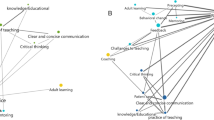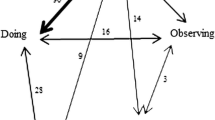Abstract
OBJECTIVE: To learn about what enhances or hinders learning in postgraduate medical education.
DESIGN AND PARTICIPANTS: Through the use of critical incident interviews, 20 internal medicine residents and 20 attending physicians/faculty were asked to describe specific situations where resident learning had occurred and where it had not occurred.
SETTING: A large teaching hospital in the Midwest.
MEASUREMENTS AND MAIN RESULTS: Factors positively associated with learning were mentioned frequently (faculty involvement, interaction, and reflection in discussion), and others only rarely (knowing outcomes of effort, resident reading) by both the faculty and the residents. Others were mentioned more often by the residents (feeling relaxed) or by the faculty (technical rationality)!
CONCLUSIONS: Residents and attendings do not always agree as to what facilitates resident learning. Recognizing actions that residents believe facilitate learning may help faculty more effectively promote resident learning. Because of the similarities of resident training across the country, the results from this study can be applied to other programs.
Similar content being viewed by others

References
Flanagan JC. The critical incident technique. Psychol Bull. 1954;4:327–58.
Boyatzis RE. The Competent Manager: A Model for Effective Performance. New York: John Wiley & Sons, 1982.
Rhee K. The critical incident interview and managerial competencies. Unpublished manuscript. Weatherhead School of Management. Case Western Reserve University, Cleveland, OH, 1992.
Spencer L. Spencer S. Competence at Work: A Model for Superior Performance. New York: John Wiley & Sons, 1993.
Motowidlo S. Carter GW, Dunnette MD, et al. Studies of the structured behavioral interview. J Appl Psychol. 1992;77:571–87.
Kolb DA. Experiential Learning: Learning as the Source of Learning and Development. Englewood Cliffs, NJ: Prentice-Hall, 1984.
Schon D. The Reflective Practioner: How Professionals Think in Action. New York: Basic Books, 1987;36.
Boyatzis R, Cowan S, Kolb DA. Reflections on curriculum innovation in higher education: the new Weatherhead MBA program. In: Sims R. Sims S (eds). Managing Institutions of Higher Education in the 21st Century. New York: Greenwood Press, 1990.
Craig JL. Teacher training for medical faculty and residents. Can Med Assoc J. 1988;15:949–57.
Stritter F. Faculty evaluation and development. In: McGuire CH, Foley RP, Gorr A, et al. (eds). Handbook of Health Professions Education. San Francisco: Jossey-Bass, 1983;294–318.
Baker JD, Cooke JE, Conroy JM, Bromley HR. Hollon MF, Alpert CC. Beyond career choice: the role of learning style analysis in residency training. Med Educ. 1988;22:527–32.
Author information
Authors and Affiliations
Rights and permissions
About this article
Cite this article
White, J.A., Anderson, P. Learning by internal medicine residents. J Gen Intern Med 10, 126–132 (1995). https://doi.org/10.1007/BF02599665
Issue Date:
DOI: https://doi.org/10.1007/BF02599665



